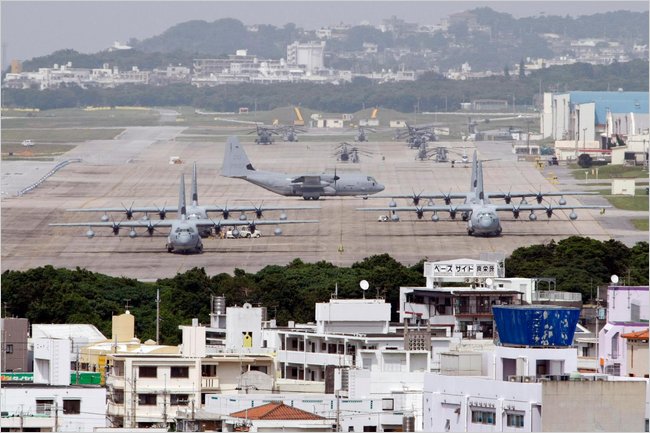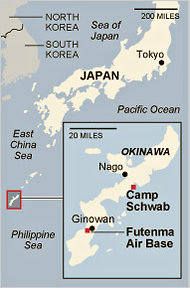June 20, 2011
Delay Is Likely for a New U.S. Air Base on Okinawa, Japanese Official Says
By MARTIN FACKLER
TOKYO -- Japan and the United States will probably agree to delay the relocation of an American air base on Okinawa, Japan's defense minister said, a decision that could encourage calls to rethink the stalled relocation plan.
The inability to find a new home for the base, the United States Marine Corps Air Station Futenma, has been a longstanding irritant in the United States relationship with Japan, the most important American ally in Asia. The defense minister, Toshimi Kitazawa, said the two nations remained committed to the current plan, signed last year, to move the busy helicopter base to a less populated part of the island of Okinawa.
However, he said that construction of a replacement would most likely be delayed beyond the target date of 2014 because of entrenched resistance to the plan on Okinawa. Mr. Kitazawa said the two nations would seek a "shared understanding" on the delay during his visit to Washington this week, when he will meet with Secretary of Defense Robert M. Gates.
"The fact of the matter is that it will be hard to resolve this by 2014," Mr. Kitazawa said in an interview with The New York Times before his arrival in the United States on Sunday. "There is no point in dragging out something that cannot be done just because we agreed to do it before. What we are saying is let's deal with this realistically."
During the visit, Mr. Kitazawa said he would also express gratitude for the far-reaching American relief operation after Japan's devastating March 11 earthquake and tsunami, and subsequent nuclear accident. He said he would also try to allay concerns about the accident, which struck the Fukushima Daiichi nuclear plant, by stressing that Japan has made considerable progress in bringing the crisis under control, partly with American and French help.
Analysts and politicians in Japan and the United States agree that Washington's rapid dispatch of 20,000 military personnel to Japan's ravaged northeastern coast deepened security ties between the two countries. However, strains remain.
There has been frustration in Washington with Japan's longstanding political paralysis, and fears that the recent disaster could drive Japan to become even more inward-looking at a time when the United States is feeling pressed to respond to China's rapid military rise.
For their part, many in Japan are quietly anxious that the United States' dominant position in the region may be slipping, even as the government of Prime Minister Naoto Kan has moved closer to the United States for fear of China's ambitions. At the same time, there are also many Japanese who question why American bases are still needed here.
Mr. Kitazawa said that during his visit he would present himself as a communications channel between Tokyo and Washington, which has been flustered by Japan's frequent changes in prime ministers. While relatively unknown in the United States, Mr. Kitazawa is a long-serving minister on the cabinet, and respected in Japan for his command of security issues.
Mr. Kitazawa said he felt confident that the United States would continue to defend Japan, and maintain its "nuclear umbrella" despite President Obama's pledge to eventually eliminate nuclear weapons. He also said the American military's relief operations in northern Japan, called Operation Tomodachi, or "friend," had been successful in creating good will among the Japanese public.
"There are Japanese who, no matter what, will say they don't like the United States or its military," said Mr. Kitazawa, who has decorated his office in the Defense Ministry with a large banner celebrating Operation Tomodachi. "You don't hear those people's voices now at all. It was a wonderful joint operation."
However, the operation has appeared less successful in placating anger on Okinawa, a southern island far from the tsunami area that feels it bears an unfair burden in hosting about half of the 50,000 United States military personnel stationed in Japan.
Okinawan leaders have vowed to resist the current relocation agreement, calling instead for the base's removal from Okinawa. For its part, the United States has said Futenma's helicopters must remain on Okinawa to be near ground units. Washington has also pressed Tokyo to honor agreements stretching back to 1996 to move the base from its current, potentially dangerous location in the center of the southern Okinawan city of Ginowan.
Mr. Kitazawa said Japan still remains committed to the agreement to move the air base to Camp Schwab, on the island's northern side. However, the political difficulties will force the two sides to replace the current deadline of 2014 with vaguer language to complete the relocation "as soon as possible," Mr. Kitazawa said.
He also rejected an alternative plan recently put forward by three United States senators to move the Marine helicopters to an existing Air Force base on Okinawa, instead of constructing a new airfield at Camp Schwab.
"We shall go with the plan agreed upon between Japan and the United States," he said.
However, there is an emerging consensus among analysts and many politicians that the current Futenma deal has become so disliked here that no Japanese leader has the political will or capacity to push it through. The previous prime minister, Yukio Hatoyama, was forced to resign shortly after reaffirming Tokyo's commitment to the existing relocation plan. The current prime minister, Mr. Kan, is a lame duck after declaring that he would soon resign over criticism of his response to the March 11 disaster.
Amid such political turnover, the alternative plan offered by the three American senators -- John McCain, Carl Levin and Jim Webb -- has won wide attention here as a signal that the two nations may need to consider other, perhaps less difficult options.
"This is seen on the Japanese side as a first step toward possibly amending the Futenma deal," said Yoshimasa Hayashi, a lawmaker in the opposition Liberal Democrats. "First, we need to push back the time frame to allow a cooling-down period. Then, we need to put everything back on the table."

Issei Kato/Reuters
Okinawa's Marine air base.
